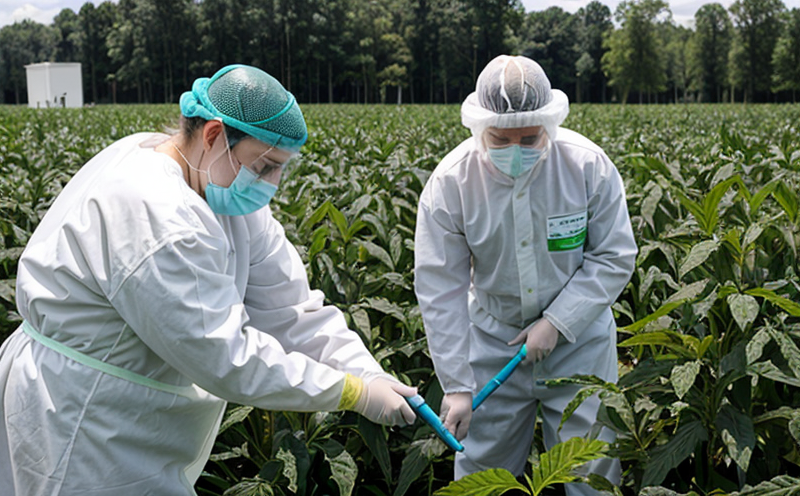ISO 11063 Soil Microbial Biomass Testing for Biocontrol Studies
The ISO 11063 standard provides a comprehensive framework for determining soil microbial biomass, which is essential in biocontrol studies. This method measures the total amount of living microbial cells present in soil samples, offering critical insights into their activity and potential impact on plant health and crop yield. Biocontrol agents play a pivotal role in sustainable agriculture by controlling pests, diseases, and weeds without relying heavily on chemical pesticides.
The significance of this testing lies in its ability to assess the efficacy of biocontrol agents before they are introduced into agricultural systems. By quantifying microbial biomass, researchers can determine whether a particular biocontrol agent is capable of promoting beneficial soil conditions that enhance plant growth while suppressing harmful pathogens or pests. This information is invaluable for developing effective and environmentally friendly crop protection strategies.
Soil microbial biomass is not only crucial for understanding the immediate effects of biocontrol agents but also for predicting long-term ecological impacts. A robust microbial community can buffer against environmental stresses, making crops more resilient to adverse conditions such as drought or nutrient depletion. Thus, this testing helps ensure that biocontrol solutions are sustainable and beneficial in both short-term and long-term agricultural practices.
The ISO 11063 protocol involves several steps: sampling, preparation of soil samples, extraction of microbial biomass, quantification using a viable count technique, and interpretation of results. Sampling must be conducted carefully to avoid contamination or alteration of natural conditions. Preparation typically includes drying the soil, grinding it finely, and sieving it through appropriate mesh sizes.
Extraction methods vary depending on the specific requirements of the study but often involve diluting the extracted biomass in a suitable nutrient medium followed by incubation under controlled environmental conditions conducive to microbial growth. Viable counts are then determined using microscopic techniques or automated cell counters.
The results provide valuable data not only for evaluating biocontrol efficacy but also for broader ecological assessments. For instance, changes in soil microbial biomass can indicate shifts in community composition that might be favorable or detrimental to overall soil health and plant performance. This information supports informed decision-making regarding the deployment of biocontrol measures within integrated pest management programs.
By adhering strictly to ISO 11063 guidelines, laboratories ensure accurate and reliable measurements that contribute significantly to scientific knowledge about soil microbial communities and their interactions with plants and other organisms in agroecosystems. This standardization fosters consistency across studies conducted by different researchers or institutions worldwide, enhancing comparability of findings and facilitating collaborative research efforts.
In conclusion, ISO 11063 Soil Microbial Biomass Testing for Biocontrol Studies is a cornerstone tool in modern agricultural science aimed at fostering sustainable practices through improved understanding of soil microbial dynamics. Its application extends beyond mere laboratory experiments; it informs practical applications that directly benefit farmers and stakeholders involved in sustainable land use.
Scope and Methodology
The scope of ISO 11063 encompasses the measurement of total viable count of soil microorganisms, focusing specifically on biocontrol agents. The methodology described within this standard outlines precise procedures for sampling, preparation, extraction, quantification, and interpretation of results.
- Sampling: Soil samples should be collected from representative locations using appropriate tools to minimize disturbance. Sampling depth may vary based on the specific objectives but generally ranges between 0-15 cm below the soil surface.
- Preparation: Collected soils are dried thoroughly and ground into a fine powder suitable for further processing. Sieving ensures uniformity, facilitating accurate extraction.
- Extraction: Extracted biomass is diluted in sterile water or other appropriate media before being plated onto selective agar containing nutrients that promote growth of target organisms.
- Viable Count: After incubation under optimal conditions, colonies are counted manually using a microscope. Alternatively, automated colony counters can be employed for efficiency and accuracy.
The standard emphasizes the importance of maintaining stringent quality control measures throughout all stages to ensure accurate representation of microbial biomass levels. Compliance with these protocols guarantees consistent results that meet international standards, thereby enhancing credibility in both research and industry applications.
Quality and Reliability Assurance
To uphold high standards of accuracy and reliability in ISO 11063 Soil Microbial Biomass Testing for Biocontrol Studies, several key practices are implemented. Quality assurance (QA) measures include meticulous training programs for personnel handling samples, strict adherence to standardized procedures, regular calibration of equipment used during testing, and thorough documentation of all steps taken.
Reliability assurance involves implementing rigorous quality control checks at various stages of the process, from initial sampling through final analysis. These include blind replicates conducted by independent observers to verify consistency in results, cross-calibrations with reference laboratories using established benchmarks, and validation against known reference materials whenever possible.
The use of advanced technologies such as flow cytometry or next-generation sequencing (NGS) further enhances the precision and robustness of these tests. NGS allows for comprehensive profiling of microbial communities beyond simple biomass quantification, providing deeper insights into biodiversity and functional roles within soils.
Continuous improvement initiatives are also integral to maintaining top-tier performance. Regular audits by internal teams and external consultants help identify areas needing enhancement or revision based on emerging trends in soil microbiology research. By fostering an environment of continuous learning and adaptation, laboratories ensure they remain at the forefront of this evolving field.





